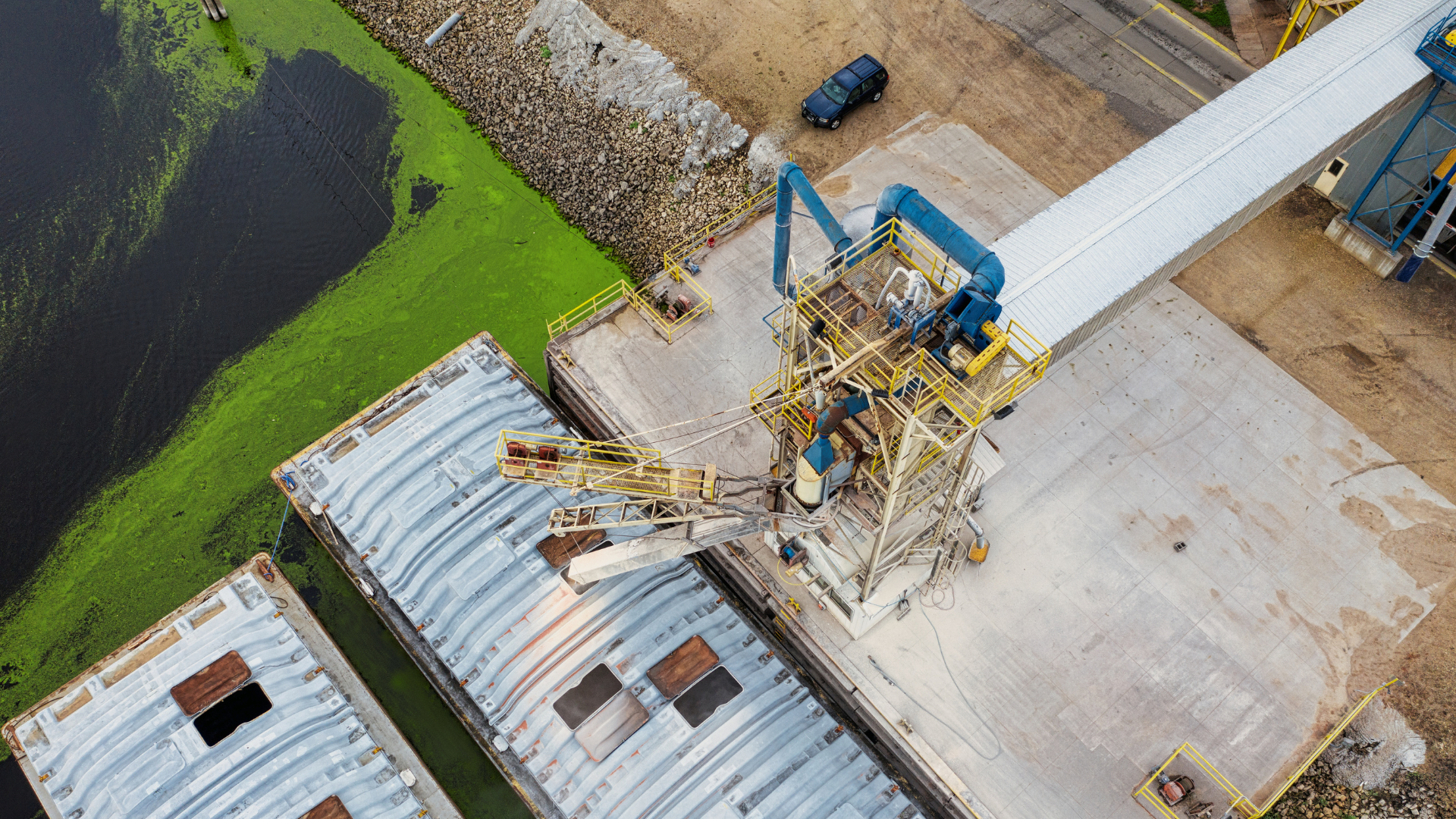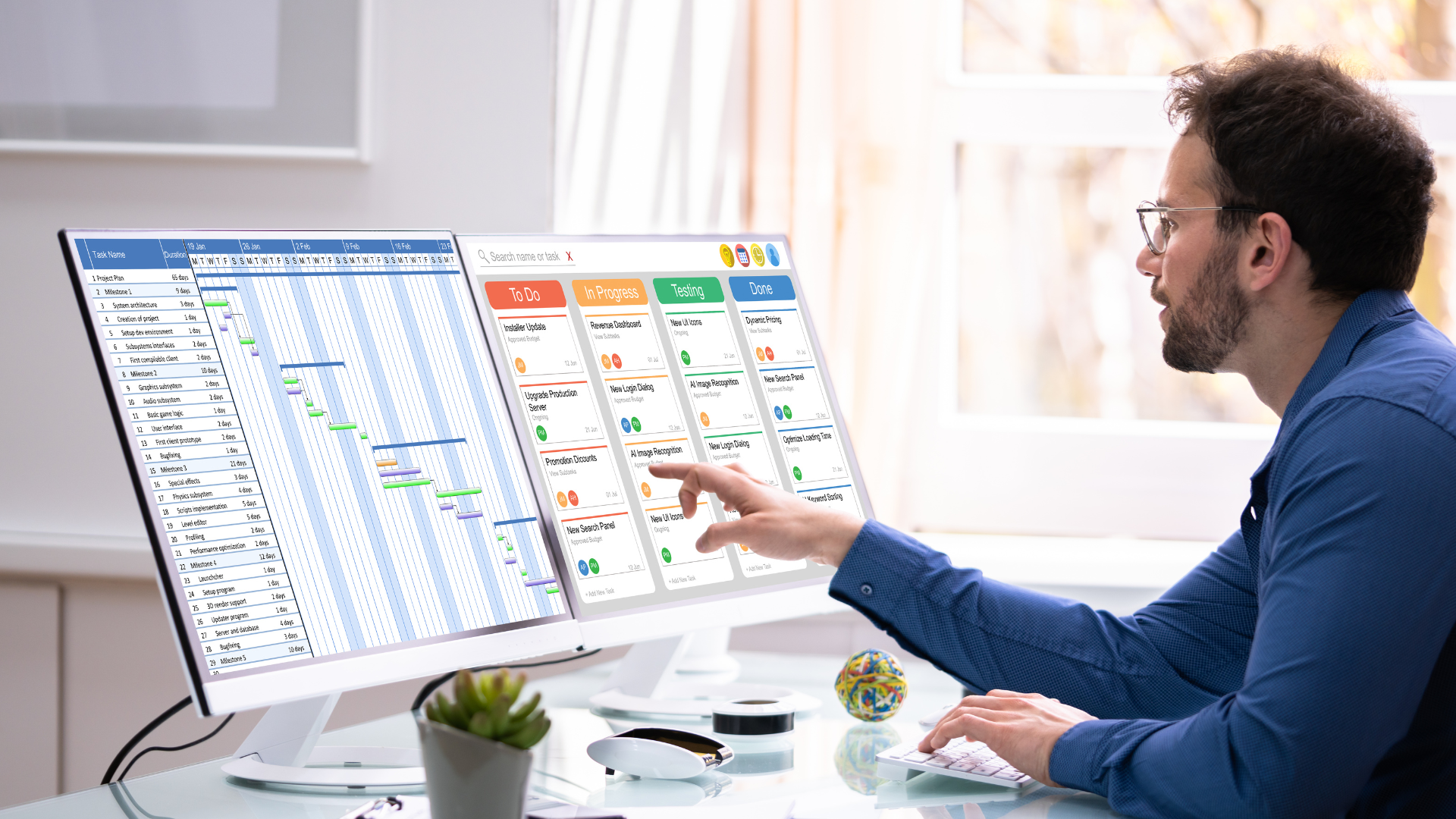When we talk about Construction CRM, the focus often shifts to general contractors.
Subcontractors do not always make it to conversations, even though they need to keep track of the sales process, project details, team performance at the job site, etc.
That’s where a Construction CRM comes in handy. But having the right tool isn’t enough; you have to use it smartly.
Going for construction crm software will help you with project management, customer interactions, and sales performance, all in one centralized system.
Construction CRM Best Practices That Help Subcontractors Grow
Subcontractors are also a key factor in construction projects. They try to manage the sales pipeline along with maintaining client relationships while tracking leads and multiple projects.
They also follow the general contractor's instructions, streamline processes, and deal with stages of business on-site, like daily logs, manage construction teams, and work on client data.
In this blog, we will discuss proven best practices to help subcontractors grow construction companies with the Builder's pipeline CRM.
Quick Insights:
- Even though most conversations focus on general contractors, subcontractors benefit from CRM to track bids, manage client relationships, and streamline project workflows.
- A construction CRM helps you stay on track with projects and ensure accurate bids.
- A strong client-GC relationship comes with real-time visibility and collaboration.
- With the right CRM like ConstructionBase, subcontractors can streamline operations, win more projects, manage relationships efficiently, and forecast revenue with clarity.
What is Construction CRM and Who Needs It?
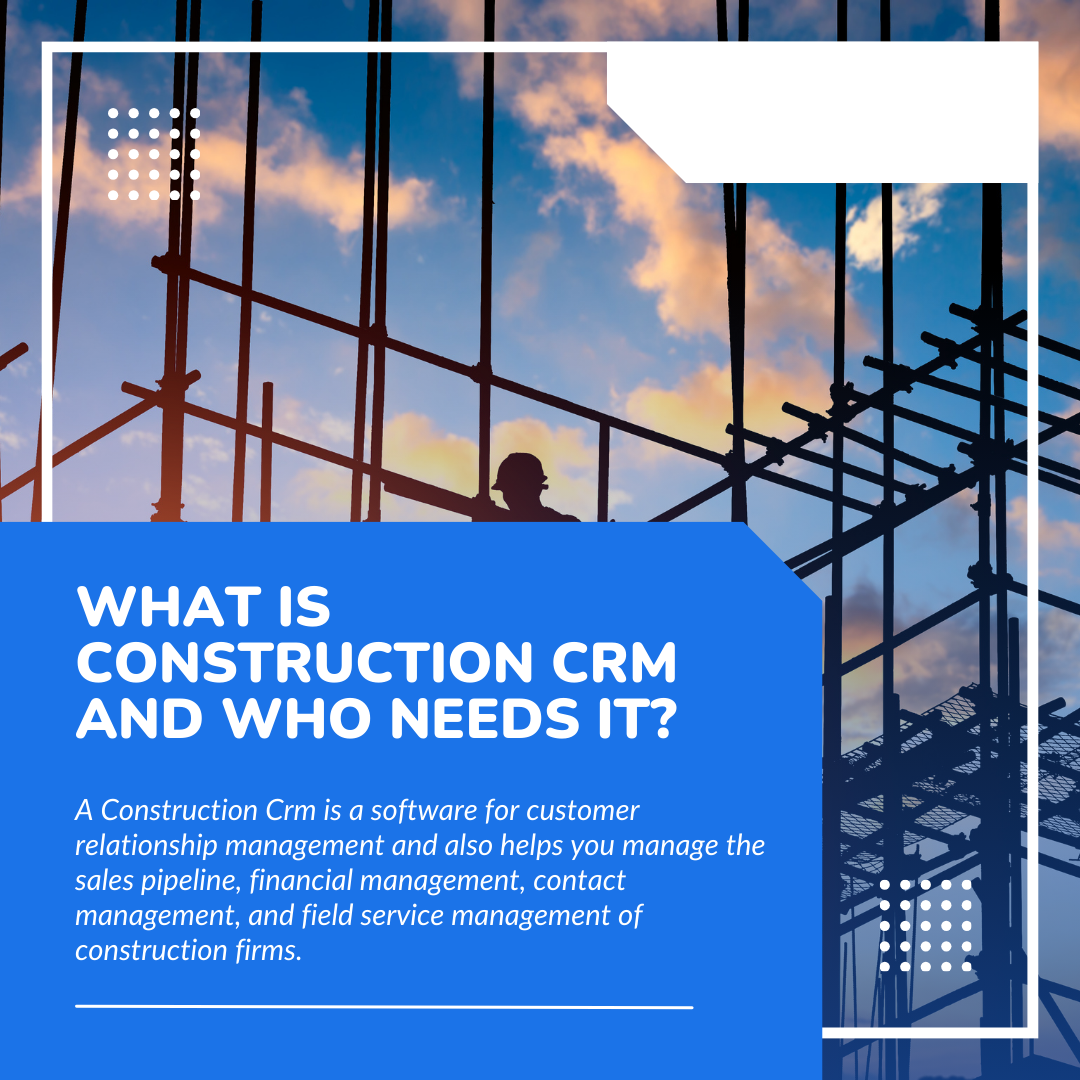
A Construction CRM is a software for customer relationship management and also helps you manage the sales pipeline, financial management, contact management, and field service management of construction firms.
Instead of relying on spreadsheets and scribble notes, construction CRM manages everything in one place with real-time collaboration and easy tracking in a mobile app.
Who needs the construction CRM?
- Subcontractors need it to manage customer interactions and make data-driven decisions about competitive bidding.
- Project managers: They need it for real-time visibility to track leads and manage follow-ups.
- Estimators: They deal with historical data, and CRM helps them generate accurate bids.
Did you know? Construction companies using CRM generate more than 28-36 new leads per month with 30% higher conversion rates.
Why Subcontractors Get Overlooked in CRM Software Conversations?
Sometimes, during construction projects, companies overlook subcontractors in data-driven decision-making. Let's talk about why?
I. Construction Companies favor General Contractors
In most construction CRM conversations, general contractors play key management roles, either in client interactions or in project delivery. The priority is given to General contractors at the expense of subcontractors.
II. Misconception about Subcontractors
The misconception about subcontractors is that they follow the instructions and statements of the general contractors. So, they dont need a subcontractor CRM features for themselves.
III. Manual Work Habits
Many subs rely on spreadsheets, notes, or scattered files, making their processes seem less “CRM-worthy” to software decision-makers.
IV. Reality of Subcontractors
In reality, subcontractors do need a CRM. They manage a lot of bids, home builders' business, and GC relationships to secure more jobs. Without a CRM, manual data entry will mess things up for them.
Read: How Contractors Can Improve Forecasting with Construction Software
5 Best Practices For Subcontractors: Simplify Workflows
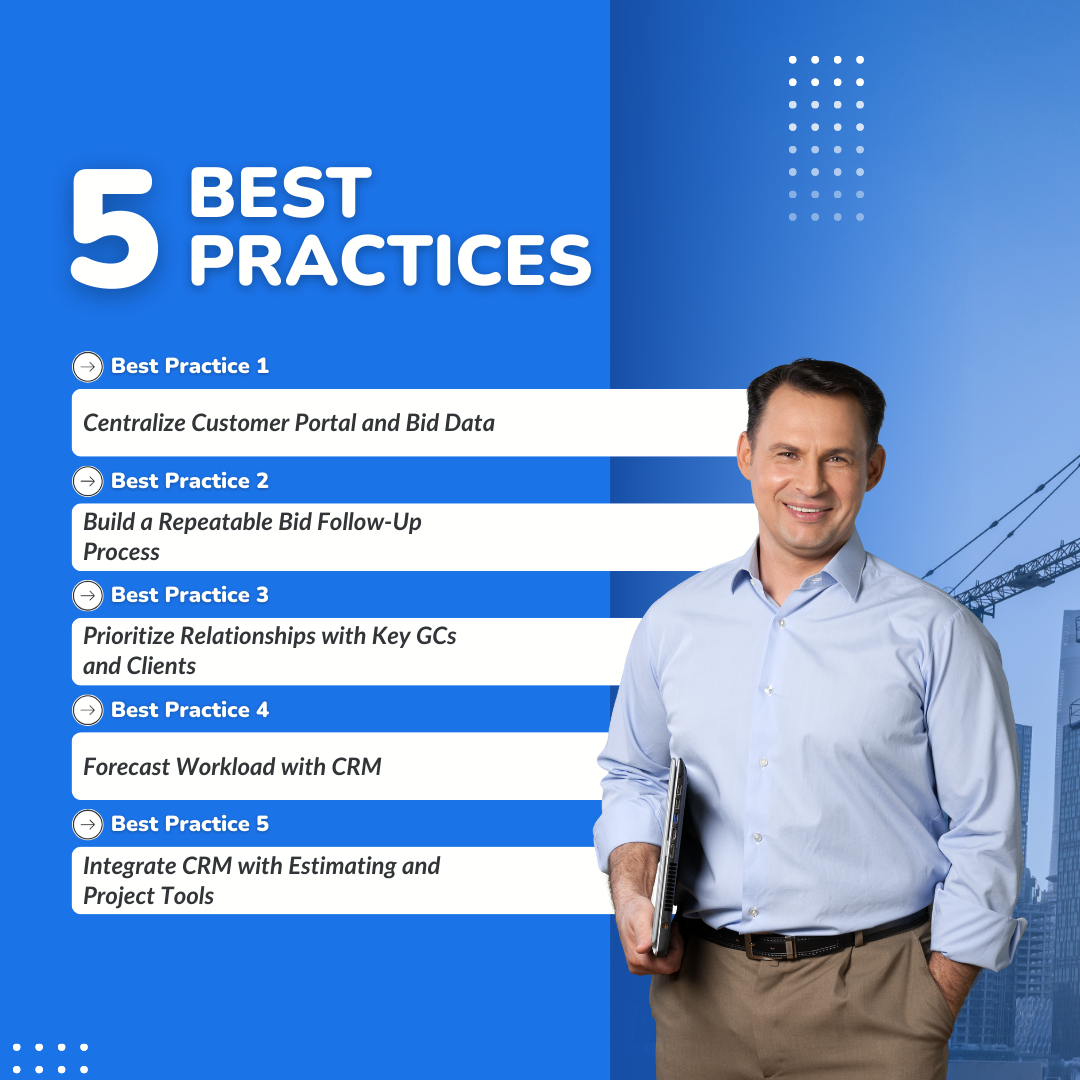
Practice 1: Centralize Customer Portal and Bid Data
Still, many subcontractors rely on manual data entry and spreadsheets for bid processing and client data storage.
Multiple folders are created for customer management data, final invoices, and deal stages of sales pipelines. This makes it hard to find the correct bid data among the boxes of project data.
How does it solve?
Scattered data can lead to missed opportunities, delayed follow-ups, and lost revenue. Centralizing information in one accessible place ensures that every bid, contact, and project detail is easy to locate and track.
How ConstructionBase Helps Construction Businesses?
- CRM with contact management: A centralized CRM stores all client information, project details, and bid data in one place. Subcontractors can quickly see project progress, track leads, and avoid the confusion of multiple folders or outdated spreadsheets.
Practice 2: Build a Repeatable Bid Follow-Up Process
Subcontractors handle multiple bids with different projects and various general contractors.
Without a structured follow-up process, some bids get forgotten, and potential clients fall through the cracks.
How does it solve?
Inconsistent follow-ups can lead to missed opportunities and inaccurate forecasting of work. A clear, repeatable process ensures no client or bid is left unattended.
How ConstructionBase Helps Construction Businesses?
- Automated Reminders: It sends automated reminders to clients for follow-up and offers so that they won't miss any appointments or opportunities.
Practice 3: Prioritize Relationships with Key GCs and Clients
Subcontractors have to manage multiple clients and various communications between general contractors and project managers.
With so many relationships to manage, it is not easy to pay attention to each client and maintain a strong bond with general contractors for the smooth operation of work.
How does it solve?
Strong relationships are critical for repeat business and long-term trust. Losing track of key contacts can hurt credibility and reduce opportunities for projects.
Using collaboration tools to track communications and project updates ensures every key contact stays informed. Subcontractors maintain strong relationships, build trust, and secure repeat business.
How ConstructionBase Helps Construction Businesses?
- Team collaboration tools: It uses integrated tools to stay connected with team members, customers, estimators, and office staff for job updates.
Practice 4: Forecast Workload with CRM
Subcontractors often struggle to understand the upcoming workload and capacity.
Bids are submitted, clients' expectations are noted, but there is little visibility into what's going on or what's pending.
How does it solve?
With no clear visibility, subcontractors may book more jobs, but the workforce or team members might not be available to take up those projects.
By tracking bids, project stages, and team availability in real-time, subcontractors can plan resources efficiently, avoid scheduling conflicts, and keep projects on track without straining teams.
How ConstructionBase Helps Construction Businesses?
- Customizable fields: It creates bids according to fields and sorts data from leads with customizable fields and proposal options.
- Real-time visibility: It helps the client portal and team members to stay on the same page and answer questions with visibility of the job site.
Practice 5: Integrate CRM with Estimating and Project Tools
Subcontractors manage details in spreadsheets, notes, or multiple files. Often, team members or subs enter the same data into the sales process multiple times in different folders.
This wastes the time of reps and opens a scope for costly human errors.
How does it solve?
When there is no CRM system, there are high chances of double booking and duplicate work.
Integration with estimating and project management tools keeps all project data, bids, and client information consistent. Subcontractors reduce errors, save time, and ensure smooth project execution from start to finish.
How ConstructionBase Helps Construction Businesses?
- Seamless Integration: The CRM connects seamlessly with estimating and project management tools to increase productivity and enhance customer relationship management.
Common Mistakes Subs Make with Construction CRM Software in the Construction Industry
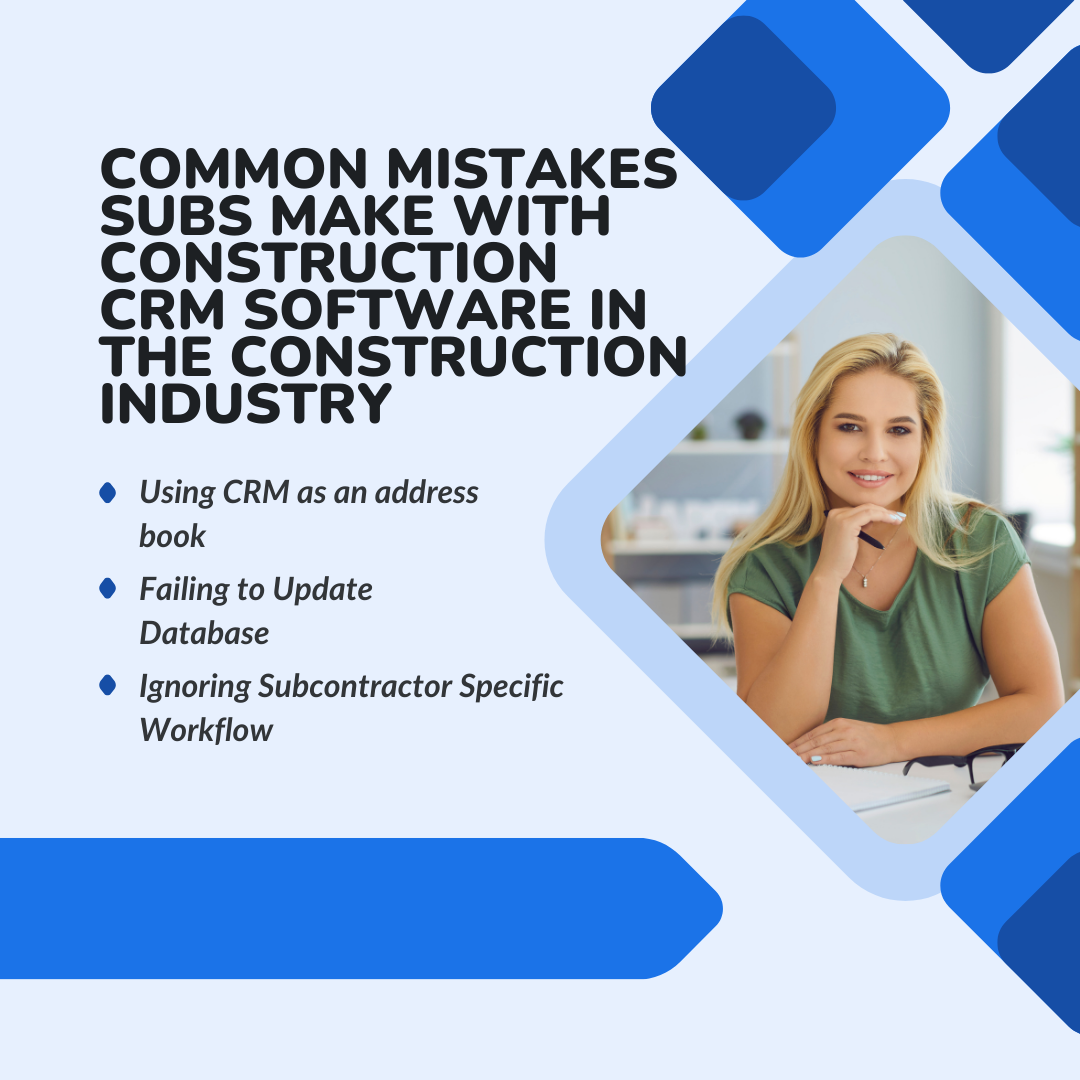
Even with the best construction CRM software, subcontractors sometimes make mistakes that prevent them from leveraging its full potential.
A. Using CRM as an address book
Some subcontractors use CRM as a digital notebook for storing client data like names and addresses, but do not use it for tracking bid projects and schedules.
This again creates the issue of scattered information and missed opportunities to win more projects.
B. Failing to Update Database
When subcontractors forget to log bids, update daily records, or track client interactions, the CRM loses its value.
Outdated data can create confusion and give clients an inaccurate picture of your business.
C. Ignoring Subcontractor Specific Workflow
Generic CRMs often don’t cater to the unique needs of subcontractors. Without features like bid tracking, project management, pipeline management, and estimating tools, subcontractors risk choosing a system that doesn’t support their workflow. This results in fewer projects and reduced efficiency.
Read: CRM for Construction Companies: Not Just for Sales
How to Choose the Best Construction CRM for Construction Professionals?
Picking the right CRM is more crucial than ticking off a features checklist. For subcontractors, a CRM must help them with their workflow. Let us see the steps to be followed to pick the right one:
Step 1: Identify the Subcontractor Needs
Start by understanding what you need the CRM for:
- Maintaining relationships with general contractors
- Tracking bids
- Managing client interactions
- Monitoring project delivery, and
- Keeping the customer portal up to date.
A clear understanding of your needs ensures you pick a system that truly supports your workflow.
Step 2: Check the CRM features
Look for features that make day-to-day work easier: automation, reminders, contact management, mobile access, real-time tracking, estimating, and proposal generation. These tools help subcontractors manage projects efficiently and reduce manual effort.
Step 3: Choose a suitable CRM
Generic CRMs often overlook subcontractor-specific requirements. So, pick a CRM like ConstructionBase that offers bid tracking, contact management, real-time collaboration, and full project visibility-everything subcontractors need to win more projects and stay organized.
Why Subcontractors Choose ConstructionBase CRM?
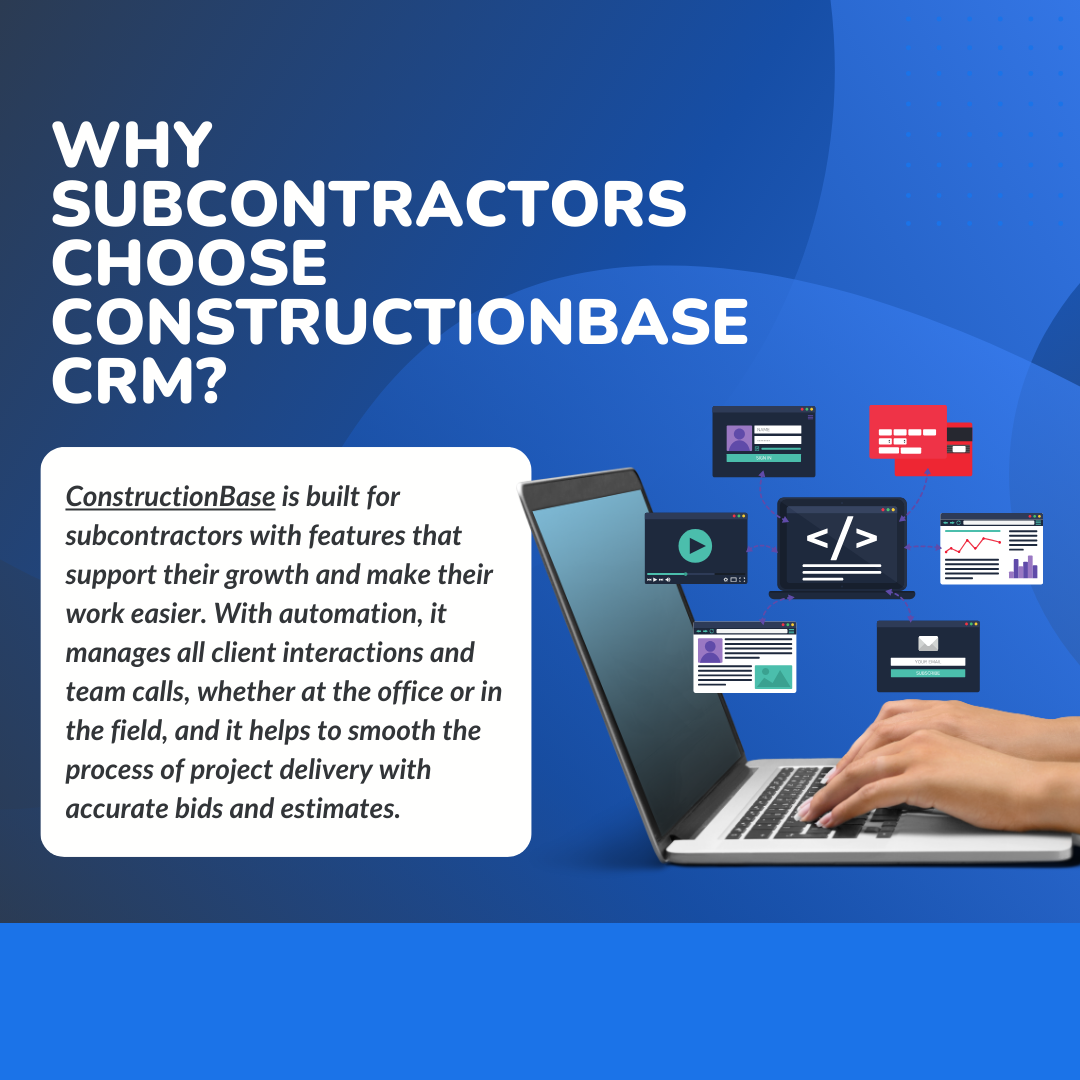
ConstructionBase is built for subcontractors with features that support their growth and make their work easier.
With automation, it manages all client interactions and team calls, whether at the office or in the field, and helps smooth the project delivery process with accurate bids and estimates.
With these key features, ConstructionBase makes work easy for subs:
- Unified Client Data: It has a centralized system for contact management and project management.
- Optimized Sales Pipeline: It helps you capture leads, automate follow-up, and think about revenue.
- Integrated Communication: Keeps emails and contacts synced with the project, whether it be onsite or offsite communications.
- Mobile Access: You can access your project anytime with a user-friendly interface and real-time collaboration.
- Proposal and Contract Management: You can easily create, send, and track professional proposals and contracts, including e-signatures, directly within the CRM.
- Sales Pipeline Overview: ConstructionBase helps you visualize your deals in an intuitive pipeline to identify bottlenecks and focus on high-priority leads.
- Document and File Management: It securely stores and organizes contracts, invoices, blueprints, and permits for quick retrieval and version control.
- Performance Analytics: Generate reports on sales trends, project outcomes, and team productivity to make data-driven decisions.
Final Thoughts: Subcontractors Deserve CRM Built for Them
Traditional CRMs often focus primarily on the sales pipeline and general contractors, leaving subcontractors juggling spreadsheets, notes, and workflow management on their own.
With a CRM designed specifically for subcontractors, like ConstructionBase, they can streamline operations, manage client relationships efficiently, and stay on top of projects.
Strengthen Your General Contractors and Client Relationships!
Stop running bids and clients through spreadsheets. With ConstructionBase, subcontractors can track clients, win more bids, and forecast revenue with clarity.
Book your demo with ConstructionBase today.
FAQs
Q.1 What are the three building blocks of CRM?
The three building blocks of CRM are contact and client management, relationship management, and project management.
Q.2 Which is the best construction CRM right now?
The best CRM depends on features and subcontractors' needs, but widely used is ConstructionBase for bid tracking, client management, and real-time visibility.
Q.3 How much does construction CRM cost?
It depends on the features and requirements of construction projects, usually between $50- $150 per month.
Have questions or need personalized advice?
Talk to an Expert Today and let our construction specialists guide you to success.


